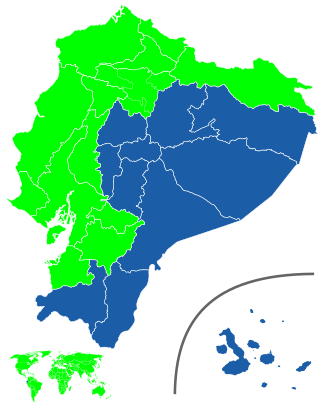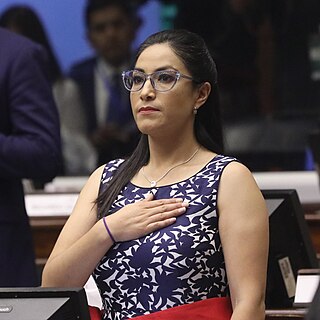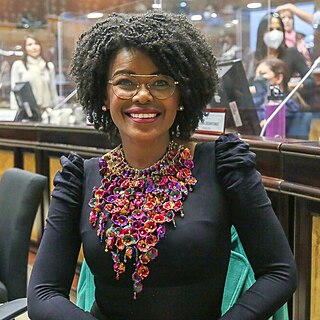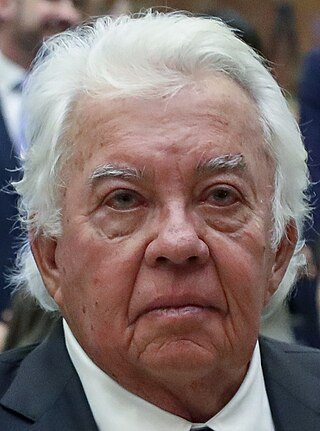The History of Ecuador covers human habitation in the region reaching back 8,000 years

The politics of Ecuador are multi-party. The central government polity is a quadrennially elected presidential, unicameral representative democracy. The President of Ecuador is head of state and head of the army on a multi-party system, and leads a cabinet with further executive power. Legislative power is not limited to the National Assembly, as it may to a lesser degree be exercised by the executive which consists of the President convening an appointed executive cabinet. Subsequent acts of the National Assembly are supreme over Executive Orders where sufficient votes have been cast by the legislators. The judiciary is independent of the executive and the legislature. Ecuador is also considered a constitutional republic.

The Revolutionary and Democratic Ethical Green Movement (MOVER, Spanish: Movimiento Verde Ético Revolucionario y Democrático) is a centre to centre-right neoliberal and environmentalist political party in Ecuador. In 2016, it had 979,691 members. Until 2021 it was known as the PAIS Alliance (Proud and Sovereign Homeland) (PAIS, Spanish: Alianza PAIS (Patria Altiva i Soberana)).
Ecuador is a country in South America.

General elections were held in Ecuador on 17 February 2013 to elect the President, the National Assembly, Provincial Assemblies and members of the Andean Parliament. The incumbent President Rafael Correa was re-elected by a wide margin. Correa's closest electoral rival, Guillermo Lasso, conceded the election shortly after it concluded.

Creating Opportunities is a centre-right political party in Ecuador. In the 2021 general election, its leader, Guillermo Lasso was elected for president.

Guillermo Alberto Santiago Lasso Mendoza is an Ecuadorian businessman, banker and politician who served as the 47th president of Ecuador from 2021 to 2023. He was the country's first conservative president in nearly two decades, marking a shift in the country's electorate.

General elections were held in Ecuador on 19 February 2017 alongside a referendum on tax havens. Voters elected a new President and National Assembly. Incumbent President Rafael Correa of the PAIS Alliance was not eligible for re-election, having served three terms. In the first round of the presidential elections, PAIS Alliance candidate Lenín Moreno received 39% of the vote. Although he was more than 10% ahead of his nearest rival, Guillermo Lasso of the Creating Opportunities party, Moreno was just short of the 40% threshold required to avoid a run-off. As a result, a second round was held on 2 April. In the second round Moreno was elected president with 51.16% of the vote.
Union for Hope is a political coalition in Ecuador for the 2021 Ecuadorian general election. Political groups from the left-wing participated, with only the Democratic Center Movement being officially on the ballot, to sponsor the presidential candidacy of Andrés Arauz for the 2021 presidential election.

Pierina Sara Mercedes Correa Delgado is an Ecuadorian architect and politician, sister of the former president of Ecuador Rafael Correa and a National Assembly member for Union for Hope who was re-elected in 2023.

Snap general elections were held in Ecuador on 20 August 2023 to vote for President of Ecuador, members of the National Assembly and two referendums. Elections followed the invocation of muerte cruzada, which dissolved the National Assembly on 17 May 2023. A run-off election was held on 15 October 2023 to elect the President after candidates were unable to reach the threshold needed to win in the first round. Incumbent president Guillermo Lasso was eligible for a second term, but he announced on 18 May that he would not stand for re-election in response to his impeachment.

Ana Cecilia Herrera Gómez is an Ecuadorian politician who was elected to the National Assembly of Ecuador. She was re-elected in 2023.

Janeth Paola Cabezas Castillo is an Ecuadorian politician and former television presenter. She was the Governor of Esmeraldas Province from 2013 to 2016 and is a current member of Ecuador's National Assembly for the Citizen Revolution Movement (RC). Cabezas was elected leader of the largest political coalition in the 2021 National Assembly, the Union for Hope (UNES).

Javier Virgilio Saquicela Espinoza is an Ecuadorian lawyer and politician who was the President of the National Assembly of Ecuador from 2022 to 2023. He served as mayor of Azogues between 2014 and 2019. He was ousted as President of the National Assembly after President Guillermo Lasso dissolved the National Assembly on 17 May 2023.

Rebeca Viviana Veloz Ramirez is an Ecuadorian politician who became the President of the National Assembly in October 2024. She represents the Santo Domingo de los Tsáchilas Province. She led the prosecution of President Guillermo Lasso in the National Assembly. This led to the President resigning and dissolving parliament which then required new elections. Veloz was re-elected and she was Vice President of the Assembly until she became the Assembly's President.

The Government of Guillermo Lasso governed the Republic of Ecuador from May 24, 2021, after the victory of Guillermo Lasso in the 2021 presidential elections.
In Ecuadorian politics, muerte cruzada is the name commonly given to a mechanism governing the impeachment of the president of Ecuador and the dissolution of the National Assembly provided for in Articles 130 and 148 of the 2008 Constitution.

Danilo Carrera Drouet is an Ecuadorian businessman and banker who served as the President of Banco Guayaquil from 1983 to 1984. He is the brother-in-law of President Guillermo Lasso, who also served as president of Banco Guayaquil. Carrera Drouet was born in Guayaquil, Ecuador.

Daniel Roy Gilchrist Noboa Azín is an Ecuadorian politician and businessman currently serving as the 48th president of Ecuador since 23 November 2023. Taking office at the age of 35, he is the second-youngest president in the country's history, after Juan José Flores, and the youngest to be elected.

Luisa Magdalena González Alcivar is an Ecuadorian politician and lawyer who ran for President of Ecuador in the 2023 general election. She was elected to the National Assembly in the 2021 legislative elections representing the Province of Manabi.



















